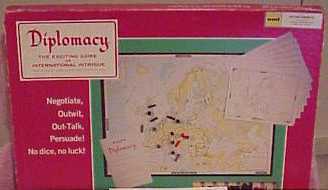The Editions
(a) 1954
(b) 1958
(c) 1959
(d) 1961
(a) Wood
(b) Plastic
(c) Metal
(d) Cardboard
(e) None of the above

The Companies
Diplomacy Around the World
The Variants
Note: In this context, "variants" refers to commercially published and sold games (other than Diplomacy) that are designed around the same core mechanics of Diplomacy. In other words, this includes variants whose rules are identical to those of Diplomacy, as well as those games which may have many substantially new concepts but whose underlying mechanics are built upon those of Diplomacy.
Teaser
In the context of this question, two editions are considered to be different if anything relating directly to the game is at all different (even subtly) in one edition than in the other. Things that do relate directly to the game include the box design, gameboard, pieces, rulebook, rule summary sheets, play-by-mail Diplomacy information sheets, etc. Things that do not relate directly to the game are things that are not specific to Diplomacy which might be found in boxes for other games, such as marketing materials, flyers advertising gaming conventions or organizations, catalogs of games from the company selling the game, information on ordering replacement parts, etc. And as with an earlier question, the term "local" is meant to exclude Avalon Hill editions that were imported to other countries and sold with translated rulebooks.
Why is the above question called a teaser? Because I'm not going to give you the answer to that one. You'll have to wait until the next issue.


